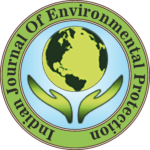IJEP 41(11): 1277-1283 : Vol. 41 Issue. 11 (November 2021)
Sushovan Sarkar1*, Debabrata Mazumder2 and Rubaid Naskar3
1. Budge Budge Institute of Technology, Department of Civil Engineering, Kolkata – 700 137, West Bengal, India
2. Indian Institute of Engineering Science and Technology, Department of Civil Engineering, Howrah – 711 103, West Bengal, India
3. Maulana Abul Kalam Azad University of Technology, Department of Civil Engineering, Kolkata – 700 064, West Bengal, India
Abstract
Poly-vinyl alcohol (PVA) is a well-known water-soluble synthetic polymer which is widely used in textile, paper and dyeing industry. in addition to this, it is widely used as food packaging and wrapping material to keep food safe inside of the container. PVA is a biodegradable polymer, that is a major concern for the pollution level of the environment. This study provieds the possible biodegradation level under suitable conditions of susceptible amount of micro-organism that are present in the working environment. Furthermore, experimental analysis was carried out into three major phases-enrichment of biomass, acclimation procedure and PVA degradation, considering the major parameters, likely pH, mixed liquor suspended solids (MLSS), mixed liquor volatile suspended solids (MLVSS) and chemical oxygen demand (COD). In this paper, the Finley method was adopted using a UV-VIS spectrophotometer with the help of a calibration curve to measure the concentration level of PVA. Thus, this study focuses on the biodegradation level of poly-vinyl alcohol (PVA).
Keywords
Poly-vinyl alcohol, Biomass, Enrichment, Acclimation, Biodegradation
References
- Dvorackova, M. and T.K. Dung. 2009. Degradation of poly-vinyl alcohol (PVA) by fenton pro-
cess. 13th International research/expert conference on Trends in the development of machinery and associated technology, Hammamet, Tunisia. - Rongrong, L., et al. 2011. The performance evaluation of hybrid anaerobic baffled reactor for treatment of PVA-containing de-sizing wastewater. Desalination. 271:287-294.
- Corti, A., R. Solaro and E. Chielline. 2002. Biodegradation of poly-vinyl alcohol in selected mixed microbial culture and relevant culture filtrate. J. Polym. Degrad. stability. 75:447-458.
- Jaroni’r, H., et al. 2003. Assessing, biodegrability of plastics based on poly-vinyl alcohol and protein wastes. J. Polym. Degrad. Stability. 79:511-519.
- Julinova, M., et al. 2010. Lignin and starch as potential inductors for biodegradation of films based on poly-vinyl alcohol and protein hydrolysate. J. Polym. Degrad. Stability. 95:225-233.
- Larking, D.M., et al. 1999. Enhanced degradation of poly-vinyl alcohol by Pycnoporus cinnabarinus after pretreatment with Fenton’s reagent. Appl. Env. Microbiol., 65:1798-1800.
- Macias, C.E., et al. 2013. Quantification of PVA hydrogel dissolution in water and bovine serum. Polym., 54:729-734.
- Nagarkar, R. and J. Patel. 2019. Poly-vinyl alcohol : A comprehensive study. Acta Sci. Pharm. Sci., 3:1-11.
- Tang, X.Y., X.S. Shuang and L. Z. hua. 2011. Degradation of polyvinyl-alcohol wastewater by Fenton’s reagent : condition optimization and enhanced biodegradability. J. Cent. South Univ. Tech., 18:96-100.
- Chiellini, E., A. Corti and R. Solaro. 1999. Biodegradation of poly-vinyl alcohol based blown films under different environmental conditions. J. Polym. Degrad. Stability. 64:305-312.
- Chiellini, E., et al. 2003. Biodegradation of poly-vinyl alcohol based materials. Progress polym. Sci., 28:963-1014.
- APHA. 1995. Standard methods for the examination of water and wastewater (19th edn). American Public Health Association.
